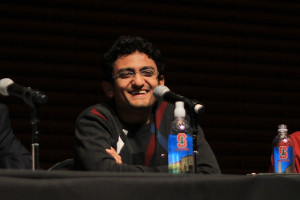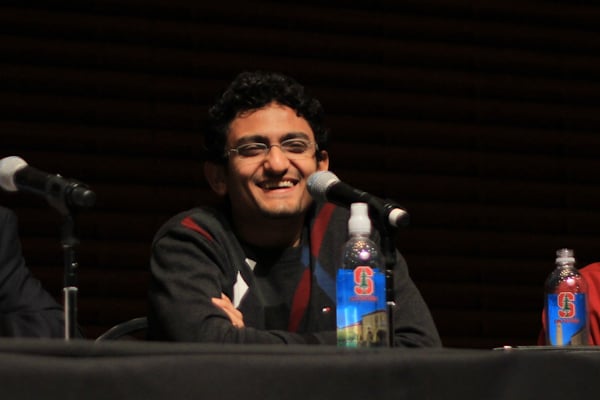
Egyptian revolutionary Wael Ghonim spoke Tuesday at Cemex Auditorium on the situation in Egypt one year after the uprisings that toppled former President Hosni Mubarak.
Ghonim was joined on the speaker panel by history professor Joel Beinin and Dr. Ossama Hassanein, chair of the board at TechWadi, a Silicon Valley-based nonprofit that promotes entrepreneurship in the Middle East. All three expressed optimism about developments in Egypt.
Moderator Omar Shakir ’07 J.D. ’13 highlighted the timeliness of the event in his introduction. The talk marked exactly one year since Ghonim’s release from a 12-day detention by Egyptian state security during the early 2011 uprisings, and a little more than one year since the beginning of protests on Jan. 25.
“It’s a time to reflect back on the accomplishments of the Egyptian people, reflect on where we are today and how we can look forward,” Shakir said.
Beinin spoke first, highlighting two main changes Egypt has experienced over the past year.
“The most important thing … which cannot be reversed is that the Egyptian people recovered [their] voice and … dignity,” he said.
The second change, he said, was the repudiation of the idea that Egypt and the Arab world face a “democracy deficit.”
Beinin named four forces on the ground that he believes will determine the outcome in Egypt: the Facebook youth, liberals, the oppositional middle class intelligentsia and the workers, whom he believes are an overlooked force in the balance of power. Behind these four forces stands the U.S. government, Beinin added.
“I am very much a believer in the notion that we have had a revolutionary upsurge in Egypt; we haven’t yet had a revolution,” Beinin said. “In the next few months…keep your seatbelts strapped — it’s going to be a very rough and, I think, exhilarating ride.”
Ghonim stressed the importance of optimism when looking at the situation in Egypt, despite recent events such as the Feb. 1 Port Said football riots, which left 74 dead.
“I see [that] despite all the challenges … we have to look at what’s happening from a positive side,” Ghonim said. “We have achieved a lot.”
Ghonim also addressed the domination of Islamist parties in parliamentary elections, emphasizing that he had “full respect” for the results of the democratic elections.
“I personally [took] to the street not to replace a dictator with another one,” he said. “I believe Egyptians have been denied the right to choose whoever governs them.”
“Egypt is going to have a bright future if we all unite, forget our differences and have the Tahrir Square spirit that we are all one,” he added.
Hassanein delivered a personal, patriotic narrative of Egyptian history. He credited Ghonim with uniting the youth and creating a revolution that gave “the power back to the people.”
“We have toppled the regime; now we need to clean up the mess,” he said. Hassanein closed on a message as optimistic as that of Beinin and Ghonim: “What does not kill us makes us stronger … Egypt will rise.”
Audience members posed questions on the transition period, the role of the Supreme Council of the Armed Forces (SCAF), education and social media.
“The discussion signaled discomfort with the dominant role of the SCAF in Egypt today, and the need to end the era of military rule that Egypt has been under for decades,” wrote Lina Khatib, program manager for the Program on Arab Reform and Democracy at the Center for Democracy, Development and the Rule of Law, in an email to The Daily. “However, what was missing from the debate was the method and mechanism through which Egypt’s youth aim to achieve this.”
“Ghonim hinted that the activists and the people are ‘learning democracy’ through trial and error … but there remains an additional need for strategic political planning that is currently lacking,” she added.
